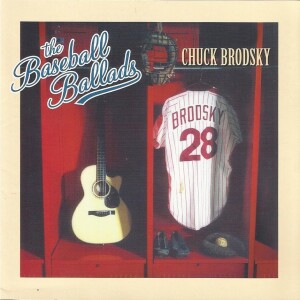 Jealous lovers with guns. Racism. Illicit drugs. The pain and confusion of growing up. And … spies? All of these, except perhaps the last, are typical fodder for American singer-songwriters. But this isn’t a typical record of folk songs. Troubador Chuck Brodsky has made an entire album of ballads inspired by baseball.
Jealous lovers with guns. Racism. Illicit drugs. The pain and confusion of growing up. And … spies? All of these, except perhaps the last, are typical fodder for American singer-songwriters. But this isn’t a typical record of folk songs. Troubador Chuck Brodsky has made an entire album of ballads inspired by baseball.
A couple of these songs appeared previously on Brodsky albums on his regular label, Greg Brown’s Red House. In the course of doing research for one of them, he made the acquaintance of the head of research of the Baseball Hall of Fame Library, and the project grew from there. That librarian, Tim Wiles, contributes to the liner notes, and of course makes a pitch to visit the Hall’s Web site, which you may be inspired to do after listening to these songs.
Brodsky wisely starts off with one of the strongest numbers — in fact, it’s the one that he first contacted Wiles for information on, “The Ballad of Eddie Klepp.” Klepp was so obscure that even Wiles hadn’t heard of him. He was the first white player to play in the Negro League, at about the time that Jackie Robinson was integrating the Majors. This medium-tempo number sets the stage for the rest of this understated album: Brodsky’s pleasant tenor and his guitar, against a backdrop of bass, drums, a little organ and a little dobro. It also gives a representative sampling of Brodsky’s lyrical style, which is solidly in the ballad tradition, well matched to the music, and with just enough rhythmic and lyric surprises to keep things interesting: “They ran him off the field before a game in Birmingham one night/made him sit up in the grandstand in the section marked “For Whites.”
Next is a tear-jerker about Max Patkin, a clown who used to travel the minor league circuit, entertaining the fans between innings: “The times changed on Max Patkin, along came rock & roll/They blare it from the speakers now, if ever there’s a lull/And some guy in a chicken suit is circling the bases/with a corporate logo on his back, and in one or two other places.”
“Dock Ellis’ No-No” is a laugher, and where the drugs come in. This song recounts the time in 1970 when Ellis pitched a no-run no-hit game for the Pittsburgh Pirates while high on LSD; he hadn’t expected to pitch that day. “Sometimes he saw the catcher/Sometimes he did not/Sometimes he held a beach ball/Other times it was a dot. Dock was tossing comets/That were leaving trails of glitter…” and he got his name in the record books, in spite of walking eight and hitting one batter.
The gun comes into play in “The Unnatural Shooting of Eddie Waitkus,” the title being a reference to the fact that it was this story that inspired David Mamet’s “The Natural.” Waitkus was shot in a hotel room in 1947 by a woman who had been stalking him for two years, although from the song, it sounds as though there was some question whether the two had more of a relationship than that.
The spy? That’d be Moe Berg, in a song inspired by the book “The Catcher Was a Spy,” by Nicholas Dawidoff. In the years before and during World War II, Berg, a highly educated Jew and the son of immigrants, apparently used his game-related travels as a cover for spying.
Another song tries to rehabilitate the image of a player named Fred Merkle, who because of the enforcement of a little-known rule in 1908, became forever known as “Bonehead” Merkle. It’s a great example of just what a song can do in pointing up the dark, cruel side of human nature.
The most powerful song is “Letters in the Dirt,” the story of an African-American player in Philadelphia in the early 1960s who suffered horribly from racist taunts by his own team’s fans. In it, Brodsky beautifully portrays a child’s confusion over the behavior of these fans, booing their own player, and his admiration for the player who stood up to it with dignity.
There are more, nine songs in all (of course), plus a seventh-track stretch in which Brodsky plays a verse of “Take Me Out to the Ball Game” on the organ. The liner notes are superb, as are the photo illustrations that accompany each song. If it has any weakness, it’s an inherent one, of making an entire album of ballads, but there’s enough variety in subject matter, and it’s short enough, to mostly avoid that pitfall. The only foul ball comes right at the beginning, when a little boy’s voice asks, “Daddy, why do they spit that brown stuff?” At least they didn’t put similar interludes between each track.
This one’s highly recommended to any fans of baseball and anyone who likes a good ballad.
(self released, 2002)
